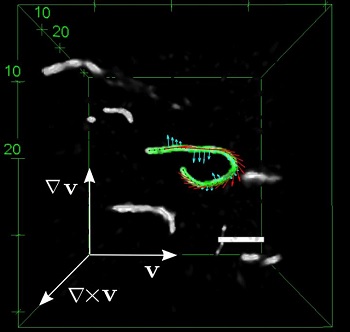A team of researchers from the FOM Institute AMOLF and Forschungszentrum Jülich have discovered that the filaments of biopolymer networks become soft when transitioning from an entwined spaghetti of filaments to aligned bow-shaped filaments.
 3D confocal microscopic image of fluorescently labelled F-actin filaments, one of which is fully analyzed, in an entangled solution of unlabelled F-actin subjected to shear flow. Source: Forschungszentrum Jülich
3D confocal microscopic image of fluorescently labelled F-actin filaments, one of which is fully analyzed, in an entangled solution of unlabelled F-actin subjected to shear flow. Source: Forschungszentrum Jülich
Usually when a sturdy material gets damaged, it becomes soft. However in biological cells it is not a damaging effect. This new research could aid in the development of renewable alternatives such as alternative options for expensive oil-based polymers.
Human cells contain biopolymer filaments and they are considered ‘semiflexible' polymers as they are not fully rigid or fully flexible. At high rates of shear, the viscosity of a semiflexible polymer solution decreases considerably due to the 'shear-thinning' effect. An example for this phenomenon can be seen when observing the flow of tomato ketchup.
The researchers discovered that at rest, the filaments possessed an irregular configuration and were entwined.
However, when in flow, the filaments could smoothly slide over other filaments as they formed hairpin-like structures that detached themselves from one another. The resulting effect led to shear-thinning in semiflexible polymer solutions.
In this study, the scientists analysed biopolymer filaments from muscle cells when they were in flow. These filaments were marked with fluorescent dyes and studied using a confocal microscope.
This new study provides knowledge about the microstructural modifications that happen during the cytoplasmic flow, which occurs in plant cells and embryos. Microtubules along with molecular motor proteins generate flows and they could help deliver nutrients and organelles.
Cellulose, amyloids and other similar natural systems are relatively stiff and the findings of this study may help to develop new related products.
This study has been published in Nature Communications journal.